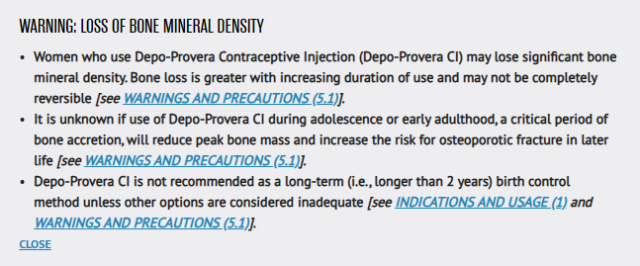Depo-Provera: Risks, Studies & Legal Concerns
Studies linked Depo-Provera birth control to an increased risk of meningioma. Meningioma tumors grow in the lining of the brain and can cause serious health issues and may require surgery to remove. Women diagnosed with a meningioma filed lawsuits claiming manufacturers didn’t warn about the risk.
Our content is developed and backed by respected legal, medical and scientific experts. More than 30 contributors, including product liability attorneys and board-certified physicians, have reviewed our website to ensure it’s medically sound and legally accurate.
legal help when you need it most.
Drugwatch has provided people injured by harmful drugs and devices with reliable answers and experienced legal help since 2009. Brought to you by The Wilson Firm LLP, we've pursued justice for more than 20,000 families and secured $324 million in settlements and verdicts against negligent manufacturers.
More than 30 contributors, including mass tort attorneys and board-certified doctors, have reviewed our website and added their unique perspectives to ensure you get the most updated and highest quality information.
Drugwatch.com is AACI-certified as a trusted medical content website and is produced by lawyers, a patient advocate and award-winning journalists whose affiliations include the American Bar Association and the American Medical Writers Association.
About Drugwatch.com
- 15+ Years of Advocacy
- $324 Million Recovered for Clients
- 20,000 Families Helped
- A+ BBB Rating
- 4.9 Stars from Google Reviews
Testimonials
I found Drugwatch to be very helpful with finding the right lawyers. We had the opportunity to share our story as well, so that more people can be aware of NEC. We are forever grateful for them.
Very informative and great info that I dont have to spend forever searching for!...
- Legally reviewed by Whitney Ray Di Bona, Esquire
- Last update: February 12, 2026
- Est. Read Time: 5 min read
What Is Depo-Provera?
Depo-Provera is a prescription birth control injection containing a progestin hormone called medroxyprogesterone acetate. The FDA approved it to prevent pregnancy in 1992.
Women typically get the shot from a medical provider every three months, but a lower-dose version called Depo-SubQ Provera 104 can be self-administered. It works by stopping the ovaries from releasing an egg. It also thickens mucus in the cervix and thins the lining of the uterus, making it more difficult for the egg to be fertilized.
Depo-Provera is most commonly used by younger women who want an effective, maintenance-free birth control method and those who cannot use estrogen or who have had difficulty with other birth control methods.
However, Depo-Provera’s link to meningioma brain tumors has given rise to Depo-Provera lawsuits against Pfizer and Pharmacia & Upjohn Company, claiming the companies failed to warn the public of the risk.
Health Risks and Injuries Linked to Depo-Provera
One of the most concerning health risks and injuries associated with Depo-Provera is an increased risk of a tumor in the lining of the brain called a meningioma.
“Meningioma is the most common type of primary brain tumor, accounting for approximately 30% of all brain tumors,” clinical pharmacist Dazhi Liu told Drugwatch. “These tumors originate in the meninges, which are the outer three layers of tissue between the skull and the brain that cover and protect the brain just under the skull.”
What Do Studies Say?
A March 2024 French study published in BMJ found that Depo-Provera may be linked to a higher risk of developing a meningioma. According to researchers, Depo-Provera users had a 5.6-fold increase in the risk of developing a meningioma after long-term use for more than a year.
An American study published in Cancers in September 2024 confirmed the meningioma risk found in the BMJ study. Researchers found that Depo-Provera use was associated with a 53% increased odds of developing a meningioma, and the risk went up with duration of use.
Meningioma Symptoms
Meningioma symptoms include vision or hearing changes or weakness in the arms or legs. Meningiomas may also cause headaches that are worse in the morning.
If you experience sudden changes in vision, memory or the onset of seizures, seek emergency care.
Other Serious Depo-Provera Side Effects
Other serious Depo-Provera side effects listed on Depo-Provera’s prescription label include bone density loss, increased risk of breast cancer and allergic reactions.
Depo-Provera and DepoSubQ-Provera have black box warnings for bone mineral density loss. A black box warning is the FDA’s strongest warning.

- Allergic reactions (swelling of face, neck or tongue)
- Blood clots
- Convulsions or seizures
- Depression
- Ectopic pregnancy (pregnancy outside of the uterus)
- Slight increase in breast cancer risk
- Vision loss
Make sure you tell your medical provider about any side effects you experience. Depending on the severity of the side effects, your provider may switch you to another method of birth control.
FDA Warnings and Regulatory Actions
In December 2025, the FDA formally added a meningioma warning to Depo-Provera’s label. The new label states that meningioma cases have been reported following use of Depo and that doctors should monitor Depo patients for signs of any symptoms of the brain tumors.
The FDA had previously required a black box warning for loss of bone mineral density but had not addressed meningioma risk until this update.
The change in the U.S. lagged behind international warnings. In September 2024, the European Medicines Agency issued direct healthcare professional communications warning providers about Depo-Provera’s link to meningiomas. Canada’s Depo label had also already included warnings that meningiomas have been reported with long-term use.
Patient Experiences With Depo-Provera and Meningiomas
Drugwatch has spoken to a few women who have experienced meningiomas after long-term Depo-Provera use, and they shared their stories with us.
Two of these women, Tina Thomas and T.C., have chosen to use initials to protect their privacy.
Tina Thomas
Thomas’ first meningioma symptom was hearing loss. Her meningioma treatment required doctors to remove the tumor to prevent it from getting worse. But it came back and affected her vocal cords. She had another surgery. Now, Thomas has permanent hearing loss and a raspy voice.
“That meningioma has really scarred my life,” Thomas told Drugwatch.
She didn’t realize that Depo-Provera was linked to meningioma until she saw a commercial on TV.
“You mean to tell me that they knew about this and they’re still giving these shots to women?” Thomas said. “They just did not value our lives at all.”
T.C.
T.C. cared for two young children — one with special needs — while managing a full-time job at a hospital. At the same time, she dealt with extreme fatigue and constant headaches that she didn’t know were signs of a meningioma.
She told Drugwatch that her life has become overwhelming.
“Since my meningioma diagnosis, I’ve been on medication and have to undergo regular MRIs to monitor the tumor,” T.C. said. “At first, it was every six months, but now it’s once a year. It’s a constant worry that the tumor might grow, and the appointments feel never-ending.”
Legal and Scientific Controversy
According to Depo-Provera lawsuits, Pfizer and Upjohn knew or should have known for years that Depo-Provera can cause or contribute to meningiomas. Even if they knew about the risk, they failed to warn patients and medical providers.
Since at least 1983, medical and scientific communities have known about the connection between meningiomas and progesterone, and Depo-Provera is a progesterone-based contraceptive.
“Depo-Provera had by far the highest risk of meningioma surgeries amongst progesterone contraceptive products studied, rendering Depo-Provera more dangerous than other drugs and treatment options designed to prevent pregnancy.”
In studies cited in legal documents, Depo-Provera was second only to cyproterone acetate in increased meningioma risk. Cyproterone acetate had already been withdrawn from the market because of meningioma risk.
“Depo-Provera had by far the highest risk of meningioma surgeries amongst progesterone contraceptive products studied, rendering Depo-Provera more dangerous than other drugs and treatment options designed to prevent pregnancy,” according to Kristina Schmidt’s lawsuit.
Lawsuits also cite that Depo-Provera’s label has been updated at least 13 times since 2003, but defendants still haven’t been warned about meningiomas.
Your Legal Options
If you have been diagnosed with a meningioma after using Depo-Provera, Drugwatch can help connect you with an attorney to review your legal options for free. There’s never an obligation to sign up, either. The choice to pursue a lawsuit is always yours.
You may be able to file a Depo-Provera lawsuit for compensation to help pay for past and future care for your meningioma, any lost wages, loss of quality of life and other damages.
After you fill out a form on Drugwatch, we will match you with one of our experienced partners who can review your case. Our partner will contact you and ask about your Depo-Provera experience. If you choose to hire them, they don’t get paid unless they win your case.
Frequently Asked Questions
Calling this number connects you with a Drugwatch.com representative. We will direct you to one of our trusted legal partners for a free case review.
Drugwatch.com's trusted legal partners support the organization's mission to keep people safe from dangerous drugs and medical devices. For more information, visit our partners page.








